#and the different camps and circles and discussions and disagreements that can and have appeared
Explore tagged Tumblr posts
Text
You should read Kimberlé Crenshaw. You should read Iris Marion Young. You should read bell hooks. You should read Kate Borenstein. You should read Angela Davis. You should read S. Bear Bergman. Ivan Coyote. Jack Halberstam. Leslie Feinberg. You should read Audre Lorde and Judith Butler. Miss Major and Sylvia Rivera and Marsha P. Johnson. Yes it is a lot of work. No I have not read them all myself either. Yes it is essential. I see people naming them all the time on here only to terribly misunderstand or undercut or tokenize them. If we are going to talk about feminisms we have an obligation to read feminists. Listen to their speeches and interviews. People have spent decades before us laying groundwork definitions and concepts. We do not have to accept them as they are but to do that work to accept, reject, or modify these theories and definitions and ideas, but we do have to actually take the time to read them ourselves and not just commentary on them, or excerpts or simplified summaries, whether that's in books or online.
#To be terribly blunt this is a list of reading which I believe is essential to supplement Whipping Girl#Now that I've finished reading it#We need to read Crenshaw on intersectionality. Young on forms of oppression.#Fricker on epistemic injustice. Borenstein and Stryker for history.#Black revolutionary women both cis and trans—try the Combahee River Collective for a start.#Transmasculine and butch theorists like Halberstam and Butler and Preciado#Transfeminine authors and activists like Miss Major and Sylvia and Marsha—not just biographies but what they themselves wrote.#I'll be reading also The Women's House of Detention by Hugh Ryan about imprisoned lesbians/transmascs and Stonewall#Beth Elliot and Sandy Stone as well—both have written fantastic refutations of radical feminism in the 80s and before#you probably should read some Foucault as well if you get the chance tbh because he's pretty foundational#this is not an endorsement of all of these authors nor what they have written#i have not read all of these pieces that i am recommending and recognize that maybe doing so is a bad idea#but more than anything i am trying to share what kinds of pieces of writing and work are out there#that Whipping Girl is in conversation with and which are in conversation in turn#also read more of Serano's later work and commentary on Whipping Girl including the afterword to e3 and such#just as you should read early Butler and then read later Butler's commentary on their adjustments to it#hell go and read Karen Barad if you want a feminist quantum/theoretical physicist's theories on gender and materialism#if someone reminds me to come back to this I will add more specific title-based recommendations possibly with PDFs or links#it's also important to read gender studies and work on masculinity theory—otherwise we acquiesce to the idea that ''man'' is not a gender#and that ''gender'' is something which only women and trans* folks experience and manhood/masculinity is a neutral or given#i am doing my best to log off of the discourse here and turn attention more to community and theory in tandem#all of my suggestions are also all anglo-centric and i desperately welcome non-anglo and decolonial/anticolonial recommendations#and while i've recommended theorists here it's also important to know about the gaps between feminist theory and feminist activism#and the different camps and circles and discussions and disagreements that can and have appeared
6 notes
·
View notes
Note
what were other friends that Lafayette made during his time in the continental army (others than hamilton and laurens)?
and also, did he pick up some/many fights with others ('cause of diferent opinions or smth) while he was in america? thank youu
Hello Anon,
sorry that it took me so long to answer you, I somewhat misplaced my draft and things went downhill from there. Thank you for our great question though. La Fayette made many other friends beside Laurens, Hamilton, Jefferson and Washington, but many of them are often overlocked. (I copied parts of a previous post that also dealt with La Fayette’s friends, so please be not surprised if some passages may sound familiar.)
La Fayette was the sort of person who made friends easily. He was not a grumpy person, being on good terms with somebody was his default mood so to speak. Some of the lesser-known friendships that he struck up during his time in America were with James McHenry, James Monroe, Henry Laurens, Nathanael Greene and Baron von Steuben for example.
James McHenry first met La Fayette when they both were members in George Washington staff. McHenry later transferred to La Fayette’s staff (March of 1781) and was one of his most trusted aide-de-camps. He often was chosen as La Fayette’s “liaison-officer”. I have three excerpts from letters by La Fayette, detailing his relationship to McHenry. The first one was written by La Fayette to McHenry on February 15, 1781, a few months before McHenry joined his staff:
My tender friendship and affectionate Regard for You, will Not lengthen this letter with Assurances from My Heart While the Heart itself must Be known to You. I intend to write You Again in a few days and with Every Sentiment of Attachement and Esteem Have the Honor to be Yours
Lafayette
The second letter was addressed to General Greene on August 12, 1781, concerning a potential transfer McHenry’s into Greene’s staff.
McHenry is So well Acquainted with My Sentiments for Him that He knows My attachement is independant of whatever Steps He Might take on the occasion. He knows I am not of a temper that finds faults with the Measures of My friends, and that I will ever feel an obligation to the Man who obliges General Greene.
The last letter was written to McHenry on December 26, 1783. McHenry at this point had already retired from the army.
As an ardent lover of America I am glad to Hear of the influence You are said to Have in Congress. As Your most affectionate friend I shall Be glad whenever You Have an opportunity to display Your abilities. If Congress do not send me Any Commands, I shall Most Certainly embark in the spring. If they Have Commands for me, I would Be thrice Happy to Receive You along with them, and to Make with you french and European travels. You ought to Make them charge you with some political commission to Courts in Europe, and I would like going as a volonteer with you. [Manuscript torn; part a line missing] Your family and our friends. Most affectionately I am for [manuscript torn; several words missing].
Lafayette
I showed you this many letters for several reasons. First, McHenry deserves more attention if you ask me. Second, they show not only their emotional relationship but also their professional relationship and illustrate how convinced La Fayette was by McHenry’s merits - and lastly, I like them all and could not decide. :-) Years later, during La Fayette’s imprisonment, McHenry was among the people who tried to help him gain his freedom.
On to James Monroe. Monroe was, just like Hamilton, close in age to La Fayette (actually, La Fayette was older then Monroe by several months) and spoke French. They both moved in the same social circles during the Revolution and had some common friends. It was also Monroe, who, with the backing of Congress, invited La Fayette to visit America once more in 1824/1825. La Fayette received the rights to some land during this visited and later gifted some of this land to Monroe so that Monroe could start paying off his mounting debts. Here is what La Fayette wrote to Monroe on December 19, 1784:
My dear Sir
I Have Received your letter to mr jefferson, and shall very Carefully deliver it. Our old friend Gibbs will give you a Bundle of papers for McHenry which I Beg you will keep for Him untill He Comes to Trenton. To morrow morning, My dear Sir, I set out for Europe, and Before I go, it is pleasing for me once more to assure you of the value I Have By Your friendship, and of the affection and regard I Have the Honor to Be With My dear Sir Yours
Lafayette
(I may or may not have chosen this letter because McHenry also makes an appearance.)
Another friend was Henry Laurens. Laurens was the father of John Laurens and the president of the Continental Congress for some time. He and La Fayette first started corresponding when La Fayette was recovering from his gunshot wound. He wrote Laurens on December, 1777:
I am indeed very importune to wraÏt so long a letter. You'l find me very troublesome, and I make haste to put an end to it by the short assurance of the eternal friendship I am with - Dear Sir Your most obedient servant
(La Fayette had a moment of self-realisation right here.)
Another very dear and very close friend of La Fayette’s was Nathanael Greene. There is a letter from La Fayette to Greene from November 10, 1780 that perfectly captures his feelings. La Fayette wrote:
My dear friend (…)For My friends, My dear Sir, I have No different feelings from those which I experience for Myself. I therefore feel for you, as I would do on My own account was I the Commander of the Southern Army. (…) But Whatever Might be hereafter the Case, Whatever Bad chance (and in our profession chance is Some thing) a Malignant fortune Might throw in Your Way, Be Certain, My dear Sir, that My friendship as well as My esteem for you are founded upon Such a Bazis As Cannot be shak' d By Any Run of Good or ill luck which May subject You to the praise or to the Blame of Common opinions. In all Cases, My Good friend, I am heartly willing to have My fate united to Yours, and By this junction of Stars to have My little share in Any thing Good or Bad that May happen to the troops Under your Command. I Beg you will present My Best Compliments to Your family and Most affectionately have the honor to be Yours forever
Lafayette
In the same letter to Greene, La Fayette also described his feeling for Henry Lee, a member of the prominent Lee family and someone La Fayette met through the army. He wrote Greene:
As I am Sure that My friend Lee will apply for being attach'd to me, I Beg leave to Support the Motion of that officer whom I Love, and on whom I Greatly Confide Both for Advice and execution.
The Baron von Steuben (what a legend) was also counted among La Fayette’s friend. The two of them spend a lot of time together during the Campaign in Virginia. La Fayette wrote to von Steuben on July 16, 1780:
I received, my dear baron, the letter you had the kindness to write me, and I am infinitely appreciative of the token of friendship you give me. (…) The confidence I have always had in your friendship and the new proof of it that you have just so graciously given me, my dear baron, assure me that you will be willing to make efforts and use your influence and authority to get first-rate men. (…) In a word, my dear baron, I put my interests in your hands and, counting on your friendship, I am utterly at ease. (…)I hope I do not need to assure you of my tender affection
This list is by no means exclusively but I think these were the most important friendships for La Fayette. Others friend that could be mentioned was Joseph Reed, William Heath and William Carmichael … now on to the “picking fights part”. No, La Fayette was nobody to pick fights. That was simply not his style. There were disagreements of course, mostly over military and army matters, but these could either be dissolved or La Fayette acknowledged that he was for the most part the more junior and inexperienced person in the disagreement. He was however somebody who was not afraid of letting his opinion be known.
There are for example Generals Gates and Conway, two officers who were involved in what was called the “Conway-Cabal”. There is a bit of a discussion nowadays about the true extent and nature of the “Conway-Cabal” but for people back then, for people like La Fayette, it was a very serious affair. Previously he had been on quite friendly terms with both Generals, even trying to form a deeper friendship with Gates, but after the “Cabal”, their relationships soured. La Fayette wrote the following about Conway in a letter to Henry Laurens on January 26, 1778:
Amongs All the men who could be sent under me Mr. Connway is the most disagreable to me and the most prejudiciable to the cause. I Confess you that love and friendship have alwals been my duties. This last sentiment I feel to the most perfect degree for General Washington. How can I support the society of a man who has spocken of my friend in the most insolent and abusive terms, who has done, and does every day all his power to ruin him, who tries to spend the fire in every part of the army and the country?
La Fayette also manged to almost get into a duel while in America - but not with an American but an Englishman. The British had sent a peace commission to America to probe the possibility of a peace treaty. One of the people they send, Lord Carlisle, insulted France in an open document. La Fayette felt offended on behalf of France and challenged Carlisle to a duel in late September of 1778 - Carlisle refused. The Marquis noted of the event in his memoirs:
In a public letter, signed Carlisle, the French nation was taxed with a perfidy too universally acknowledged to require any new proof. With the effervescence of youth and patriotism, M. de Lafayette seized this opportunity of opposing the commission; and the first impulse of M. d'Estaing was to approve of his conduct. A haughty challenge was sent from head - quarters to Lord Carlisle: the answer was an ill - explained refusal, and the impetuosity of M. de Lafayette was attended with a good result, whilst the prudence of the president was ridiculed in every public paper.
Roughly two decades later he wrote in his mauskripts:
Lord Carlisle refused, -- and he was right.
I hope that I could answer your question and I hope that you have/had a fantastic day!
#ask me anything#anon#marquis de lafayette#general lafayette#lafayette#historical lafayette#letters#1778#1780#1781#1783#1784#1777#american revolution#american history#french history#james mchenry#james monroe#henry laurens#nathanael greene#baron von steuben#duelling#lord carlisle#henry lee#america#france#george washington#john laurens#alexander hamilton#thomas jefferson
36 notes
·
View notes
Note
Okay, I feel like an idiot for not getting this, but the show still portrays Robyn and RWBY in the wrong for what they did. Robyn WAS meant to be portrayed as reckless and temperamental, while Ruby was wrong for lying, and Blake and Yang were wrong for telling Robyn (Weiss was an accomplice to both). I don’t think you’re wrong, I just want an in-depth explanation, or a link to one you’ve already done on the topic, please.
No problem! I’ve definitely discussed this extensively, though sadly it’s not in one, uniform place since most of that discussion has taken place over hundreds of asks like this one. (Someday I’ll sit down and create a detailed tagging list for just such purposes...) If you’d still like a link, a somewhat decent one might be my RWBY Recaps since I touch on this issue throughout Volume 6 and 7, though even then that’s just me skimming the surface. I try to get recaps up the same day as the episode, which necessitates summarizing some issues just for practicality’s sake.
To try and provide at least a bit of an explanation here, I’d like to highlight a question: How do you know the show portrays all these things? How do we know that Robyn is in the wrong, that Ruby shouldn’t have lied, that Blake and Yang were foolish to tell Robyn, etc.? If someone had never seen RWBY before what scenes, dialogue, and imagery would you point to as evidence for these conclusions? That’s what separates an argument embedded within a narrative (the show says that lying is wrong) vs. an argument that the viewer applies to the story (I think lying is wrong). Providing evidence is just step one though. Then it’s a matter of determining whether a) The evidence itself is persuasive, b) The evidence is substantial enough to prove the claim, and c) The evidence is not undermined by other aspects of the story.
Let’s take a specific example: Ruby lying is portrayed as wrong. What’s the evidence for this? Over the last year I’ve heard a lot of people say, “Ruby looks guilty when she talks about her lying, so obviously it’s painted as wrong.” However, “looks guilty” is not a specific moment in the story and there is no “obvious” connection between the two. Just because a character thinks they might be in the wrong doesn’t mean the story isn’t going to come in and reassure them of the opposite. Which is precisely what happens in RWBY. Looking at the whole context of these scenes, we see a very different message than “Ruby is wrong to lie.” We start off with Yang asking whether they’re really going to keep quiet and yes, that cues the audience into the fact that everyone might not agree with Ruby. She might, in fact, be wrong. However, her response is

“What about it?” What’s there to discuss? Ruby doesn’t seem to think the conversation surrounding Oscar, Ozpin, the lamp, and lying is terribly important and as our primary protagonist her perspective holds weight. As the “simple soul” of this story we’re primed to take her viewpoint as fact and the show, in turn, follow’s Ruby’s perspective very closely: What she believes is portrayed as morally correct in this world. (That’s a whole other argument to prove but one specific example would be the airship debacle. Ruby believes stealing the airship is necessary and the story reinforces that belief all the way through).
Ruby then gets defensive. We are telling Ironwood these things! Or, um, we will. You all saw what Atlas was like.


Note that Ruby herself is making a very unpersuasive argument. “How things looked when we flew into Atlas” does not automatically equal “It’s perfectly justified to lie to our general.” Her justification skips a TON of conversation about, say, how the office scene severely undermines the “he’s not trustworthy” assumption that Mantle initially gave them. Thus, this flimsy argument leaves room for the other characters to call Ruby out and teach the audience that she’s in the wrong here (or at the very least that she is presenting a highly debatable perspective incorrectly as a fact). But RWBY doesn’t do that. Every character here agrees with Ruby’s choice and supports her reasoning. First Blake with “but that doesn’t mean we should trust him yet.”


Then Weiss with “We need to play along for a while”


Then Yang with “Okay.”

By the end of this conversation everyone agrees with Ruby: lying was necessary and none of them are concerned with when she will decide to tell the truth. They’re satisfied with a very noncommittal “we will,” implying that - like Ozpin - it’s okay if Ruby decides for herself when someone is trustworthy enough. Could be a few weeks, could be a few years, but the point is they’re both given complete power to make that call (more on that below). The only character left who might provide a different perspective is Oscar who, yes, questions Ruby like Yang did... but then goes on to do nothing and say nothing about this from then on out. He doesn’t pressure Ruby to tell the truth. Or tell Ironwood himself. Or even grapple in the background with their ongoing lies. This is what I mean by some evidence outweighing others. A short flashback where a character very hesitantly suggests that Ruby might be wrong - mirroring a conversation we just had where the outcome was everyone agreeing with her - can not compare to Oscar keeping happily silent for the rest of the volume. He does not send the message to the audience that Ruby is wrong because his silence acts as a passive agreement. Oscar must have been persuaded like everyone else was since he’s not doing anything about this. Or even looking conflicted. Why would we think he still disagrees with Ruby when none of that disagreement is shown? Then, when he finally does break his silence it’s done with humor.

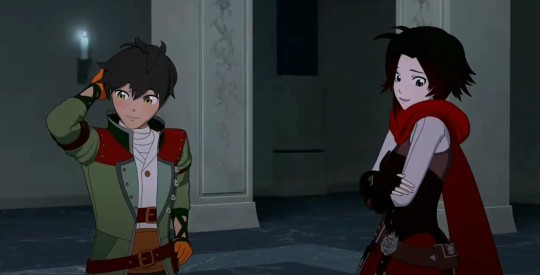
(Sorry for the bad screenshot I couldn’t get the loading bar to go away lol)
Oscar doesn’t treat this situation seriously, telling Ruby with weight and conviction that the lying needs to stop. Tone is important in a story and this scene’s tone encourages the audience not to take this issue seriously either. Ruby lying about Salem? That’s not a horrific topic that others have a right to be furious over! It’s just something you laugh about - oh wait


See, RWBY’s problem is not just that Ruby’s lying is treated as a simplistic “Yeah you’re in the right” thing, but that this simplicity is coming off of a volume that directly contradicts this. Volume 6 is all about how keeping the Salem immortality secret is The Worst Thing Ever. It makes people shout, punch, drive Ozpin away, bad-talk him whenever he comes up... The evidence of Volume 6 heavily supports the argument “Keeping this secret and telling lies to your allies is really, reeeeally bad. Bad enough that no one will forgive you for it weeks later.” Which means that when Ruby does the exact same thing in Volume 7 (with far less justification imo, but that’s a whole other argument) you’d expect there to be a similar level of fury. For the story to show us that lying is indeed bad like it said it was last year, especially when one of the people who argued that lying is super bad, mere days ago in-world, is now turning around to do it herself. The show should be presenting Ruby as, if not outright wrong, at least hypocritical... but as demonstrated above, we’re not getting that. Who’s mad at Ruby? Who’s punching her? Who’s driving her away because didn’t we establish that liars shouldn’t lead? Who’s calling her a hypocrite and demanding that she change her ways? Who’s acknowledging that she’s exactly like Ozpin? No one... except for Ruby herself:

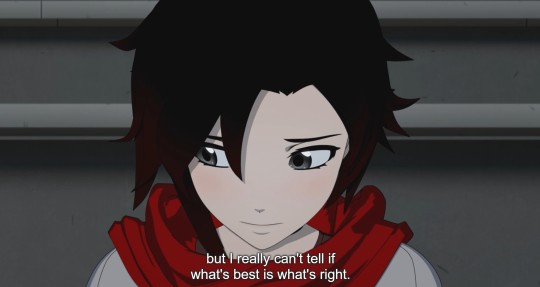
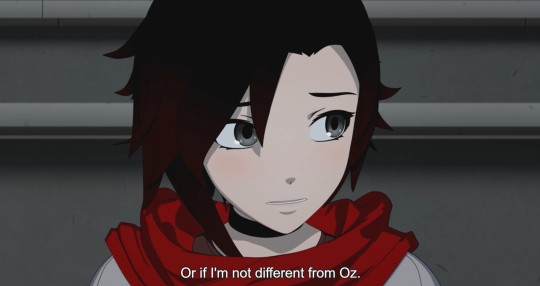
This is very good evidence for camp “lying is portrayed as wrong.” Ruby, in a moment of self-reflection, begins to acknowledge that she may have made a horrible choice. The problem is that it’s really only “begins.” Remember, the show’s whole context is necessary to accurately read any individual lines of dialogue and this dialogue’s context is “Qrow tells Ruby she’s mistaken”:
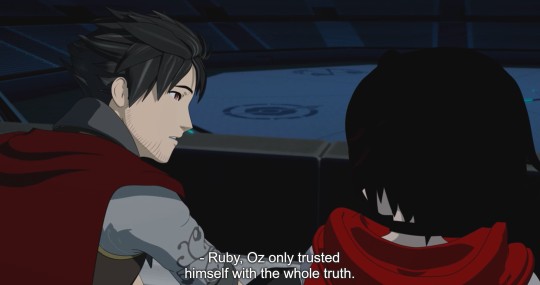
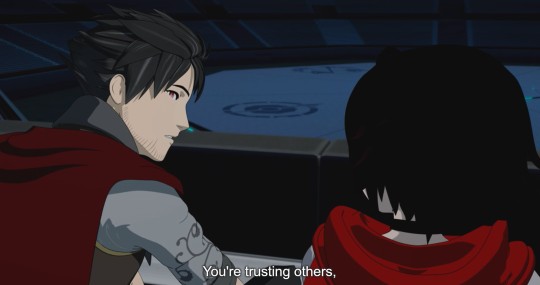
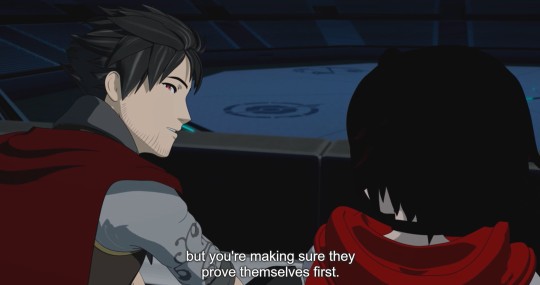
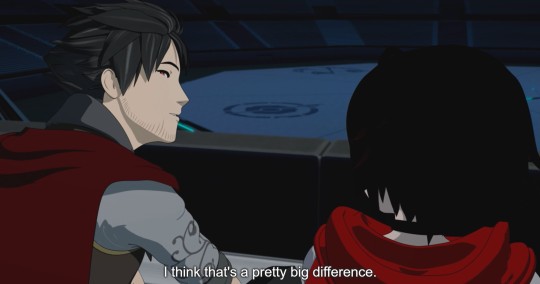
Not only does Qrow halt Ruby’s self-reflection in its tracks - she in turn never fires back that he’s wrong to absolve her - he does so in an entirely unpersuasive manner. Qrow claims that the difference between Ruby and Ozpin is that Ruby trusts others after making sure they prove themselves first. Problem is, that’s exactly what Ozpin did. He kept secrets until specific individuals had proven themselves trustworthy and then they learn specific information to reflect that trust. Ruby is to Team WBYJRN what Ozpin is to his inner circle. And arguably neither party reveals everything: Ozpin keeps the Salem secret but reveals everything else, Oscar reveals Salem but we don’t hear him say anything about Jinn, there being a question left, or why Ozpin isn’t there. The show sets up that Ozpin is bad for not telling the group that the relic attracts grimm, yet it fails to call out Ruby for likewise not telling Ironwood that the relic attracts grimm when he wants to entrust it to them. We also have other individuals like Yang who appear to be keeping the Spring Maiden secret. So not only is the claim “Ozpin only trusted himself” not accurate, not only are both parties only trusting after others “prove themselves first,” but arguably both never provide the full truth anyway. Qrow fails to establish that Ruby is acting any differently from Ozpin, the show fails to point out that Qrow is a fallible character whose perspective shouldn’t be trusted here, and the show likewise fails to acknowledge the incredibly important differences in Ruby and Ozpin’s situations: a thousand year old leader not telling a bunch of barely trained kids the world’s biggest secret is not the same thing as kids not telling an established ally who has been fighting this war for years this secret when he’s unknowingly wasting necessary resources on a doomed plan. The evidence tells us that Ruby is exactly like Ozpin except that Ozpin had better justifications for keeping those secrets... but what this scene tells us instead is that Ruby is ~different~ and Ruby is right to have lied. That’s the takeaway. Qrow gives the thumbs up to lying to Ironwood and no one challenges him on this, ergo that’s the story’s stance. It’s all we’re left with. We can’t claim the show thinks differently when it doesn’t show us that.
The last saving grace would have been for there to be consequences for these lies. You can have every single character go, “Yeah! This is the right thing to do!” and then allow the plot to put them in their place, forcing them to discover later on that they were wrong. However, that (again) doesn’t happen. The consequences for lying end up being an attempted arrest... which Ruby rejects. By insisting that she shouldn’t be arrested - shouldn’t face the chosen punishment for (in part) this crime - she rejects that she did anything wrong in the first place. Ruby wins the fight in a spectacular manner, does so with confidence, and the end, like her scene with Oscar, is played for laughs. None of this encourages the audience to take Ruby’s potential mistakes seriously, let alone teaches us that they are, in fact, mistakes. She’s supposed to be the hero of this scene and just a silly kid later on.


So if the question is “Where does the story tell us that Ruby lying is wrong?” I’d reply, “It doesn’t.” Yang, Blake, Weiss, Qrow, Oscar, and JN by further silence all agree with Ruby’s position (the exception, as far as we’ve seen, might be Ren. But as of yet we don’t know exactly what he’s upset about). The story draws a comparison to Ozpin, only to unpersuasively insist that Ruby is different from him. She also faces no consequences for her actions and never learns/admits that what she did was wrong. It’s not enough for us to apply our own ethics of “Lying is wrong” to a story. The story itself has to actually do the work to present the act as wrong and have something come out of that: punishment, growth, apologies, etc.
Now apply this sort of work to everything else listed above. We might interpret Robyn as reckless (I do) but when does the story acknowledge that? It’s not when Qrow, our hero, agrees with her by standing at her side and attacking Clover. If the show wanted to say “recklessness is wrong” then it wouldn’t have had the hero support that (or would, at least, acknowledge that the hero is also in the wrong - something we admittedly might still get in Volume 8. If Qrow later says, “I shouldn’t have attacked Clover with Robyn” that will indeed convey that message. But we don’t have it yet). When are Blake and Yang presented as in the wrong for trusting her? Is it when the Ace Ops call them out on that, but Yang still insists it was right? (Pay attention to who gets the last word in fights - that’s often the perspective the story is upholding. By ending on that perspective it’s the one that’s given the most weight). Or is it when the Ace Ops as a whole are rejected for their support of Ironwood and soundly trounced, thereby painting all their views as equally incorrect? (If the Ace Ops are the bad guys here, why in the world would the audience think their perspective about Yang and Blake is the correct one?) Or was it when the story rewarded them by not making Robyn betray them, ensuring that Yang and Blake face no consequences for that decision? The plot never does anything that makes Blake and Yang go, “Oh man... we shouldn’t have trusted her.” Reading stories like this is always more complicated than just the first thing you spot on screen. Robyn is absolutely portrayed as temperamental... but that doesn’t mean that temperamental as a personality trait is portrayed as bad by the story. Not when the volume as a whole paints her position as the right one: Ironwood is a bad guy now and anything - even temperamental actions - is justified in the name of stopping him. That context turns what should be a flaw into something the story wants us to uphold: “Yeah! Ironwood is horrible for making this arrest! Wait...Robyn is fighting back against it? Hell yeah!! You go, girl!!!!” Her being on the supposedly “correct” side of this disagreement paints any bad actions as necessary.
So whenever someone makes a claim about any story, ask them for some evidence. Then see if you find that evidence persuasive - compare it to your own evidence from the source, not just general feelings about what you think the source was doing. There’s a reason why professional analysis requires engaging with the primary source over and over and over again - because it’s really easy to make truthful sounding statements, but that doesn’t necessarily mean it’s supported by the canon. When it comes to RWBY, what RT might have intended to do and what the audience assumes is happening is often not in line with what we actually see on screen.
29 notes
·
View notes